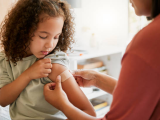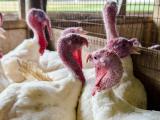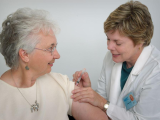Sep 19, 2006 (CIDRAP News) – Sanofi Pasteur today announced the start of the first clinical trial of an H7N1 influenza vaccine, intended to guard against the threat of a pandemic caused by H7 strains of avian influenza.
Current concern about a flu pandemic focuses mainly on the H5N1 avian flu virus, which has infected at least 247 people and killed 144. But H7 avian flu viruses have caused a number of mild illness cases and one death in the past 3 years.
Sanofi Pasteur, part of the Sanofi-Aventis Group, said it launched a phase 1 trial of its H7N1 vaccine today at the University of Bergen in Norway. The vaccine is a split-virus product grown in cell culture rather than in eggs, the method usually used to produce flu vaccines.
Development of the H7N1 vaccine is part of a European Union (EU) collaborative effort, called FLUPAN, to boost pandemic preparedness in the EU.
"A highly pathogenic H7N1 avian influenza virus which caused outbreaks in Italian poultry in 1999 has been modified so that it is safe to use and grows well in mammalian cell culture," FLUPAN coordinator Dr. John Wood said in a Sanofi news release.
He said the vaccine virus was developed by the United Kingdom's (UK's) National Institute for Biological Standards and Control and the University of Reading, which are two of six partners in FLUPAN. The others are Sanofi Pasteur, the University of Bergen, Italy's Istituto Superiore di Sanita, and the UK Health Protection Agency.
The trial involves 60 healthy people between the ages of 20 and 40, who will receive two doses of either 12 or 24 micrograms of the vaccine, with or without an aluminum hydroxide adjuvant (immune response booster), said Dr. Lars R. Haaheim of the University of Bergen.
H7 avian flu viruses that have infected humans include the H7N7 strain that swept through Dutch poultry farms in 2003, forcing the destruction of about 30 million birds. The virus infected 89 people and caused generally mild symptoms, but one veterinarian died. In addition, two people were infected and suffered mild flu-like illnesses during a poultry outbreak of highly pathogenic H7N3 virus in British Columbia, Canada, in early 2004.
Also, a few Italian poultry workers were found to have antibodies to H7N1 and H7N3 viruses when they were tested in connection with avian flu outbreaks that occurred in Italy in 2002 and 2003. The workers did not report any flu-like illness at the time, but one reported conjunctivitis, according to a report in the Journal of Infectious Diseases in October 2005.
"While most vaccine development has focused on H5N1 strains, avian H7–containing viruses remain a significant pandemic threat and have caused infections in humans in Europe over the last three years," the Sanofi release says.
H5N1 and H7N1 are not the only avian flu strains considered to have current pandemic potential. Chiron Corp., now part of Novartis, is developing an experimental H9N2 vaccine under a contract with the US government. That strain caused serious illness in three people in Hong Kong in 1999 and 2003.
Sanofi Pasteur is producing an experimental H5N1 vaccine for the US government under a $150 million contract awarded in September 2005.
See also:
Sanofi Pasteur site with link to Sep 19 news release (click on "Sanofi broadens preparedness with first clinical trial of novel cell based H7N1 vaccine")
http://en.sanofi-aventis.com/
Emerging Infectious Diseases report in December 2004 on human illness from H7N3 avian flu in British Columbia
http://www.cdc.gov/ncidod/EID/vol10no12/04-0961.htm
Sep 13, 2005, CIDRAP News story on Italian poultry workers with antibodies to H7N1 and H7N3 avian flu viruses: "Low-pathogenic avian flu viruses can infect humans"
Jul 27, 2005, CIDRAP News story "Momentum builds for cell-culture flu vaccines"


















